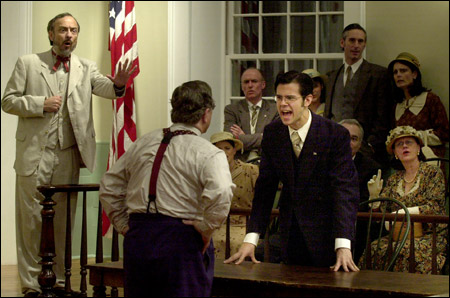The folks at 2nd Story Theatre are clever in many ways, only one of which is their usually dandy stage productions. With this one they’ve taken an annoying problem — having to close down for several weeks to have a sprinkler system installed — and turned it into an advantage.

FACE OFF: Wind presents nattering nabobs and oratorical excess.
|
The courtroom drama Inherit the Wind, by Jerome Lawrence and Robert E. Lee, is being performed in the courtroom of the old Bristol Statehouse (through October 29), one town over from their Warren digs.
Talk about being made to feel part of the setting — audience members are even recruited to join the jury, and some of us sitting at the back may find ourselves sitting next to “townspeople” actors commenting on the proceedings.
The story is based on the 1925 Scopes Monkey Trial in Tennessee, when a high-school biology teacher was arrested for teaching the ideas of Charles Darwin. It was first staged in 1955, the year after the Army-McCarthy hearings in the Senate, when anti-Communist patriotism took the form of stifling free speech. Two years earlier, Arthur Miller’s The Crucible had made a similar attempt after McCarthy’s House Un-American Activities Committee succeeded in witchhunting left-leaning citizens in and out of government.
ADVERTISEMENT
 |
But it’s the ingenuity of setting the play in an actual courtroom that’s the main offering here — theater-in-the-round gone one better with theater-all-around. As a drama, Inherit the Wind certainly strikes familiar notes in these days of a Patriot Act. But the play, directed by Ed Shea, is a stagy melodrama and the production is further weakened by a couple of key roles not being reined in.
The characters are nicely set up for us. It’s the day before the trial, and the teacher’s girlfriend, Rachel Brown (Erin Olson), wants him to “tell them it was a joke!” But Bertram Cates (Patrick Poole) refuses. “Man wasn’t just stuck here like a geranium in a flower pot,” he tells her.
Arriving that day to lead the case for the prosecution is Matthew Harrison Brady (Vince Petronio), a Christian fundamentalist and twice a losing presidential candidate. The townsfolk love him and his speechifying as much as the radical right in 1925 loved William Jennings Bryan, the right-wing orator with a similar background whom the character is based on. Brady fulminates to the townspeople that the uproar the trial is causing is “an attack from the big cities in the North.”
Representing such Yankee nattering nabobs is celebrity defense lawyer Henry Drummond (Eric Behr). John Scopes’s lawyer was the famous Clarence Darrow, who made a career of championing the underdog and opposing capital punishment with Will Rogers-style wit. This dignified defender of tolerance and science is demonized as an agent of the devil, “maybe the devil himself,” by the Reverend Brown (Jim Brown), Rachel’s father.
This is where the play and the production start to break down. It’s not impossible to convey convincing Bible-thumping preachers (witness John Lithgow in Footloose), but the safest way is to have them act with less uncontrolled fury and sprayed spittle than such fanatics can get away with before their cheering congregations. A theater audience is the wrong choir, one that wants to understand the minds, not the foolish rants, of such men. The same problem happens here with the character of Brady, whose puffed-up, hyperventilating, oratorically excessive surface is all we get to see and hear.
Much is made up for by the more thoughtful performance of Behr as Drummond, and not just because he gets most of the wry lines and sympathetic positions. Behr immediately establishes a person of depth and substance — qualities no less available to unsympathetic characters. He gets help from some good acting in supporting roles. Poole does well as the hapless teacher, but Olson shines as his adamantly Christian girlfriend. As the cocky reporter E.K. Hornbeck, Joanne Fayan relishes all the snappy screwball-comedy retorts she gets to deliver. (To second-grade teacher Rachel: “You feed the children of the Hillsboro from that little truck garden of your mind?”)
As Eileen Warburton points out in an excellent essay commissioned by 2nd Story for this production, Lawrence and Lee wrote the play in the late 1940s, and it wasn’t staged until the political atmosphere was safe enough to accept it. Minds are rarely changed as swiftly as art commands. The law that convicted Scopes wasn’t repealed until 1967. A well-intentioned work like Inherit the Wind needs a lot of work by us off-stage for its intentions to come through.